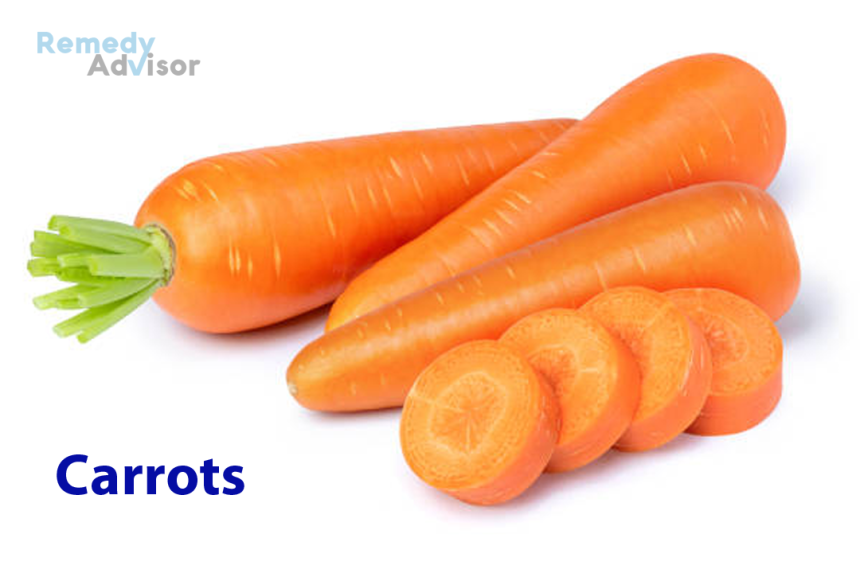They are universal. Every marketplace consists of at least certain selection of carrots available. There are large carrots and little tiny baby ones and each size in-between.
Carrots are usually known for nurturing eye health, and research is now displaying that they may be beneficial for avoiding and handling other medicinal concerns. So what does the investigation report?
Cardiovascular health
In a study, researchers separated a group of mice, which were produced to develop atherosclerosis, into two groups. Half were fed a veggies-free diet; the others were fed a diet that consists of vegetables, like peas and carrots. Within 16 weeks, scientist measured the cholesterol in the blood vessels. They concluded that the mice that were fed the vegetable enhanced diet had plaques that were 38 percent smaller. There was also a 37 percent reduction in serum amyloid, which means there was a decrease in swelling. “The results indicate that a diet rich in green and yellow veggies prevents the growth of atherosclerosis and might thus lead to a decrease in the hazard of coronary heart disease.”
Research of 3,061 Japanese men and women between the ages of 39 and 80 found that high levels of alpha- and beta-carotene in the body were linked to a decreased risk for cardiovascular disease mortality.
In a study, researchers followed 559 men, with an average age of 72, for 15 years. Over the course of that time, 197 of the men died from cardiac illness. Men with higher consumptions of alpha- and beta-carotenes (from carrots) had considerably lower rates of death from cardiovascular disease. Researchers concluded that the dietary intake of carrots was inversely related with death from cardiovascular disease in aged men.
Cancer preventive
Research observed the association amongst colorectal cancer in rats and the consumption of raw carrots or falcarinol, a natural fungal illness pesticide found in carrots.
Researchers separated 24 rats with precancerous colorectal tumors into three groups. The first group was fed regular rat food plus 10 % freeze dried carrots; the second group was fed rat food plus falcarinol (the amount equal to the freeze-dried carrots); and the third group was fed only normal rat food. After 18 weeks, the researchers discovered that the rats that were fed carrots or falcarinol were one-third less probable to develop colorectal cancer tumors compared to those nourished the standard rat food. The researchers concluded that, “The present study offers a new perspective on the recognized epidemiological relations amongst high consumption of carrots and decreased chances of cancers.
Researchers at the Anderson Cancer Center calculated the relationship between the consumption of foods containing phytoestrogens like carrots, and lung cancer. The researchers compared the dietary histories of 1,674 people with lung cancer to 1,735 healthy people. The results were theatrical. After controlling for smoking status and other known risk factors, the occurrence of lung cancer in people with the highest levels of phytoestrogen consumption was 46 percent lesser that the individuals with the lowest levels of phytoestrogen consumption. While recognizing that, “there are restrictions and concerns regarding case control research of diet and cancer,” the researchers note that, “these facts offer additional support for the limited but growing epidemiologic proof that phytoestrogens are related with a decrease in chance of lung cancer.”
Prevention of diabetes
Research found that the antioxidant pigments in carotenoids found in foods like carrots, tomatoes and dark leafy greens might help avoid people from developing diabetes. Scientist investigated data from 4,493 subjects, between the ages of 18 and 30, who participated in the research. During the 16 years that the group was followed, 148 people developed diabetes. Nonsmokers who had diets high in carotenoids were found to be far less probable to develop diabetes. In reality, they had about half the risk. Individuals who smoked seemed to develop no such advantage.
Lowers risk for benign prostatic hyperplasia (enlarged prostate)
A study observed the role that fruits and vegetables, like carrots and cantaloupes, might play in assisting men avoid the often uncomfortable disorder known as benign prostatic hyperplasia (BPH). Researchers linked about 6,000 men in between the ages of 46 and 81 who had surgery for or signs of benign prostatic hyperplasia to more than 18,000 men who had not experienced prostate problems. The participants who ate an average of at least one-and-a-half daily servings of beta-carotene foods, like carrots and cantaloupes, had a 13 % lower chance of an enlarged prostate compared to those who ate only about one serving per week. Researchers noted that their “results are steady with the hypothesis that a diet rich in veggies might decrease the incidence of BPH.”
Lowers risk for age-related macular degeneration (armd or amd)
A Dutch study included more than 4,000 persons aged 55 years or older. (AMD, a disorder in which there is a loss of central vision, is the primary cause of blindness in this age group.) Throughout the eight years of the research, scientists linked changes in eye health of the participants with their consumption of nutrients including foods with beta-carotene, like carrots. Researchers found that the participants, who consumed an above-median intake of foods that contain beta-carotene, as well as vitamins C, E, and zinc, had a 35 percent lesser chance of AMD.
Another study, also found comparable outcomes. Research, which involved 4,519 people between the ages of 60 and 80, detected an opposite association intake between the consumption of dietary carotenoids, like carrots, vitamin A, alpha-tocopherol, and vitamin C with AMD. Those with maximum consumption of these nutrients were least probable to develop AMD.
Clearly, carrots are an excellent addition to the diet. But, individuals must not go overboard. When consumed excessively, carrots might cause hyper-carotenemia, a disorder in which parts of skin and the whites of the eye changes to orange and yellow. The cure is very simple consume less carrots.







